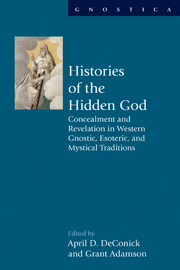 Histories of the Hidden God
Histories of the Hidden God Book contents
- Frontmatter
- Contents
- Acknowledgments
- Contributors
- Introduction: In search of the hidden God
- Part I Concealment of the Hidden God
- Part II The Human Quest for the Hidden God
- Part III Revelations of the Hidden God
- 11 Revealing and concealing God in ancient synagogue art
- 12 The invisible Christian God in Christian art
- 13 On the Mothman, God, and other monsters: The demonology of John A. Keel
- 14 Hidden away: Esotericism and Gnosticism in Elijah Muhammad's Nation of Islam
- 15 Conscious concealment: The repression and expression of African American Spiritualists
- 16 Occulture in the academy? The case of Joseph P. Farrell
- Afterword: Mysticism, Gnosticism, and esotericism as entangled discourses
- Bibliography
- Index
16 - Occulture in the academy? The case of Joseph P. Farrell
from Part III - Revelations of the Hidden God
- Frontmatter
- Contents
- Acknowledgments
- Contributors
- Introduction: In search of the hidden God
- Part I Concealment of the Hidden God
- Part II The Human Quest for the Hidden God
- Part III Revelations of the Hidden God
- 11 Revealing and concealing God in ancient synagogue art
- 12 The invisible Christian God in Christian art
- 13 On the Mothman, God, and other monsters: The demonology of John A. Keel
- 14 Hidden away: Esotericism and Gnosticism in Elijah Muhammad's Nation of Islam
- 15 Conscious concealment: The repression and expression of African American Spiritualists
- 16 Occulture in the academy? The case of Joseph P. Farrell
- Afterword: Mysticism, Gnosticism, and esotericism as entangled discourses
- Bibliography
- Index
Summary
Before us is a case study of Joseph P. Farrell who, as his many-sided persona appears on the Web and in books, interests us on account of his effective and transgressively unusual popular culture use of our categories of Hidden History, Transtheism and Gnosticism. To understand the significance here of Farrell and his audience, it is necessary to recall the competing senses of marginalization and victimhood in contemporary American society and politics as one moves back and forth from elite or official culture and the populist culture. In this connection, the theme of political and economic struggle and struggle for control of the broader culture comes to the fore. Likewise, that theme is written between the lines of Farrell's conspiracist and transgressively alternative nonfiction books even as it is explicitly brought out in Farrell's learned, theological direct attacks on the developments leading to what Farrell reconstructs as the theological deep causes for Western secularity.
As our intent is to furnish a preliminary map of a multifaceted phenomenon, our study simply connects the dots found in publicly available material, without verifying the accuracy of the factual claims in Web and published material. Such material is here taken at face value rather than investigated in skeptical depth. The Farrell phenomenon has made heavy use of arguments concerning the Western obsession with a principle of “simplicity” in thinking about matters divine. For Farrell this is a false divinity, a dubious kind of thinking which has led to growing distraction from the God of Abraham and early Christianity.
- Type
- Chapter
- Information
- Histories of the Hidden GodConcealment and Revelation in Western Gnostic, Esoteric, and Mystical Traditions, pp. 298 - 311Publisher: Acumen PublishingPrint publication year: 2013


